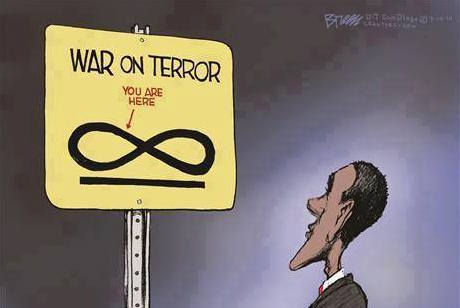Why and How to End the War on Terror
Since 2001, the U.S. has been in a constant state of war. With the goal of countering terrorism, we have used military force to varying degrees in Afghanistan, Iraq, Syria, Libya, Yemen, Pakistan, Somalia, and we appear to be in the early stages of using it in Nigeria. Our nation is eternally grateful to the dedicated women and men who serve and have served in the military. But since 2001, they have been tasked with an impossible mission: destroying terrorism through military force – putting out the fire with gasoline. The war on terror has not only failed to end terrorism, it has fueled it, all the while costing trillions of dollars and hundreds of thousands, if not millions, of lives.
The human cost of these wars has been astronomical. From 2001 through 2015, 2,381 American soldiers were killed in the Afghanistan War and 4,495 American soldiers were killed in the Iraq War. There have been roughly 26,000 documented civilian deaths attributed to the Afghanistan War and roughly 165,000 documented civilian deaths attributed to the Iraq War.
Because of the difficulty – and often the US government’s lack of interest – in tracking civilian casualties, the actual civilian death toll is likely much higher. And accounting for civilian deaths caused by indirect results of war such as lack of access to food or medical care, some estimates put the Iraq War civilian death toll at over half a million people.
In the war against ISIS in Iraq and Syria, two American soldiers have been killed, one just nine days ago, and the US has admitted responsibility for 21 civilian casualties. However, Airwars, a non-profit monitoring group tracking the US-led coalition’s air campaign against ISIS, estimates that between 1004-1419 civilians have been killed in coalition airstrikes since August 2014. And if you account for the US invasion of Iraq and consider how it helped fuel the rise of ISIS and destabilize the region, the US surely bears some of the responsibility for the nearly half a million civilian deaths caused by the Syrian Civil War.
US military involvement in Libya, Yemen, Pakistan, and Somalia has resulted in relatively few American deaths, however there have been thousands if not tens of thousands of war-related civilian deaths in these countries.
While the US isn’t responsible for every civilian death in these wars, the US government’s initiation of the Afghanistan and Iraq wars makes it partially responsible for far more civilian deaths than those caused directly by the US military.
The financial cost of American military adventurism since 2001 is equally staggering. The National Priorities Project estimates that the US has spent roughly $1.67 trillion fighting wars since 2001, meaning every hour, taxpayers are paying $8.36 million on war. To put that number into perspective, the average California taxpayer saw almost $800 of their taxes spent on Department of Defense contracts in 2014.
Considering the incredibly steep price our nation, and the world, has paid and continues to pay for our war on terror, we might expect that the effort has been at least somewhat successful in reducing terrorism and eliminating terrorist networks. However, since the war on terror began, deaths caused by terrorism have increased and terrorist networks are arguably stronger than they’ve ever been. So despite whatever short-term victories the administration claims in the war on terror, anyone suggesting that the current approach is working is at best mistaken and at worst lying, as is anyone suggesting the solution is more military force.
The war on terror is like the war on drugs: it doesn’t work, or at least not the way we were told it would. It doesn’t work to end or even reduce terrorism, just like the war on drugs doesn’t work to end or reduce drug abuse. Instead, it works for defense contractors and oil companies the way the war on drugs works for prison guard unions and private prison corporations. In both cases, there is an industrial complex working to perpetuate the conditions that keep business booming. In both cases, corporations and special interests are spending exorbitant amounts of money on campaign contributions and lobbying in order to influence policy. The prison industrial complex invests in policies that increase incarceration and recidivism rates. The military industrial complex invests in policies that increase military spending and the chance of war. For example, the US’ largest defense contractor Lockheed Martin, whose Executive Vice President recently cited the financial “benefits” of the Syrian Civil War, spent $176,875,927 on lobbying from 2001-2015 according to OpenSecrets.org, averaging almost $12 million per year.
Beyond similarities, these two seemingly endless wars are actually perpetuating each other. The Washington Post recently published an article explaining how the NSA has been sharing information collected from its vast databases with the FBI, the DEA, the IRS, and through them, local and state police departments. Despite the fact that these databases were supposed to be used for the sole purpose of preventing terrorism, they are now used to arrest people for all types of crimes, fueling mass incarceration and trampling on our fourth amendment rights. Meanwhile, mass incarceration, fueled by the war on drugs, has disenfranchised millions of citizens and left poor communities – particularly poor communities of color – in such dire economic straights that some people enlist in the military out of economic necessity.
While many Americans have woken up to the failure of the war on drugs, and more and more Americans are waking up to the deep-seated structural problems with our criminal justice system, perhaps fewer Americans have woken up to the failure of the war on terror and the fundamental flaws of our country’s approach to foreign policy in the last two decades. Just as our criminal justice system needs to tackle the root causes of crime in order to reduce it, so too does our foreign policy need to address the root causes of terrorism, as well as other international conflicts. All of these problems at the most basic level require a compassionate approach: an approach that recognizes the humanity of others. Rather than pouring money into jails, prisons, and militarized police forces, we need to invest in education, job creation, drug treatment, and reentry programs. Rather than pouring money into planes, bombs, and bullets, we need to invest in thoughtful diplomacy and robust humanitarian aid.
Policy overhauls in criminal justice and foreign policy are long overdue, accomplishing them requires strategic campaigns fueled by grassroots action, and Peace Action has almost 60 years of grassroots campaign experience. If you want to see the same shift in consciousness that we’re starting to see in our approach to criminal justice take place in our country’s approach to foreign policy, join the peace movement. Follow Peace Action on Facebook and Twitter for updates and ways to take action. Donate to Peace Action or the Peace Action Education Fund today to help create a more just foreign policy and a more peaceful world.




